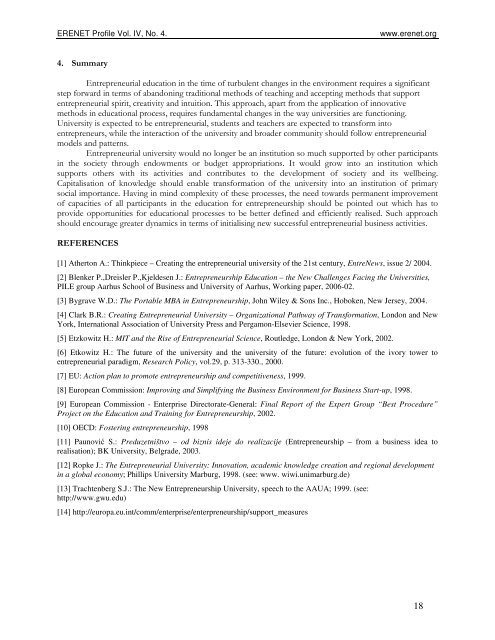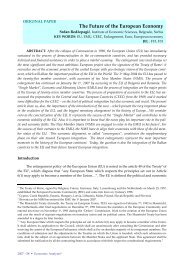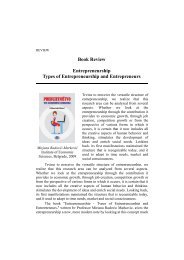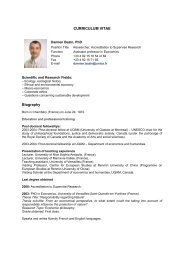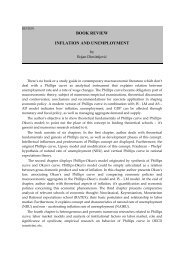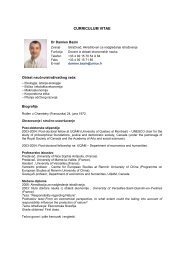Issue 16
Issue 16
Issue 16
Create successful ePaper yourself
Turn your PDF publications into a flip-book with our unique Google optimized e-Paper software.
ERENET Profile Vol. IV, No. 4.<br />
www.erenet.org<br />
4. Summary<br />
Entrepreneurial education in the time of turbulent changes in the environment requires a significant<br />
step forward in terms of abandoning traditional methods of teaching and accepting methods that support<br />
entrepreneurial spirit, creativity and intuition. This approach, apart from the application of innovative<br />
methods in educational process, requires fundamental changes in the way universities are functioning.<br />
University is expected to be entrepreneurial, students and teachers are expected to transform into<br />
entrepreneurs, while the interaction of the university and broader community should follow entrepreneurial<br />
models and patterns.<br />
Entrepreneurial university would no longer be an institution so much supported by other participants<br />
in the society through endowments or budget appropriations. It would grow into an institution which<br />
supports others with its activities and contributes to the development of society and its wellbeing.<br />
Capitalisation of knowledge should enable transformation of the university into an institution of primary<br />
social importance. Having in mind complexity of these processes, the need towards permanent improvement<br />
of capacities of all participants in the education for entrepreneurship should be pointed out which has to<br />
provide opportunities for educational processes to be better defined and efficiently realised. Such approach<br />
should encourage greater dynamics in terms of initialising new successful entrepreneurial business activities.<br />
REFERENCES<br />
[1] Atherton A.: Thinkpiece – Creating the entrepreneurial university of the 21st century, EntreNews, issue 2/ 2004.<br />
[2] Blenker P.,Dreisler P.,Kjeldesen J.: Entrepreneurship Education – the New Challenges Facing the Universities,<br />
PILE group Aarhus School of Business and University of Aarhus, Working paper, 2006-02.<br />
[3] Bygrave W.D.: The Portable MBA in Entrepreneurship, John Wiley & Sons Inc., Hoboken, New Jersey, 2004.<br />
[4] Clark B.R.: Creating Entrepreneurial University – Organizational Pathway of Transformation, London and New<br />
York, International Association of University Press and Pergamon-Elsevier Science, 1998.<br />
[5] Etzkowitz H.: MIT and the Rise of Entrepreneurial Science, Routledge, London & New York, 2002.<br />
[6] Etkowitz H.: The future of the university and the university of the future: evolution of the ivory tower to<br />
entrepreneurial paradigm, Research Policy, vol.29, p. 313-330., 2000.<br />
[7] EU: Action plan to promote entrepreneurship and competitiveness, 1999.<br />
[8] European Commission: Improving and Simplifying the Business Environment for Business Start-up, 1998.<br />
[9] European Commission - Enterprise Directorate-General: Final Report of the Expert Group “Best Procedure”<br />
Project on the Education and Training for Entrepreneurship, 2002.<br />
[10] OECD: Fostering entrepreneurship, 1998<br />
[11] Paunović S.: Preduzetništvo – od biznis ideje do realizacije (Entrepreneurship – from a business idea to<br />
realisation); BK University, Belgrade, 2003.<br />
[12] Ropke J.: The Entrepreneurial University: Innovation, academic knowledge creation and regional development<br />
in a global economy; Phillips University Marburg, 1998. (see: www. wiwi.unimarburg.de)<br />
[13] Trachtenberg S.J.: The New Entrepreneurship University, speech to the AAUA; 1999. (see:<br />
http://www.gwu.edu)<br />
[14] http://europa.eu.int/comm/enterprise/enterpreneurship/support_measures<br />
18


